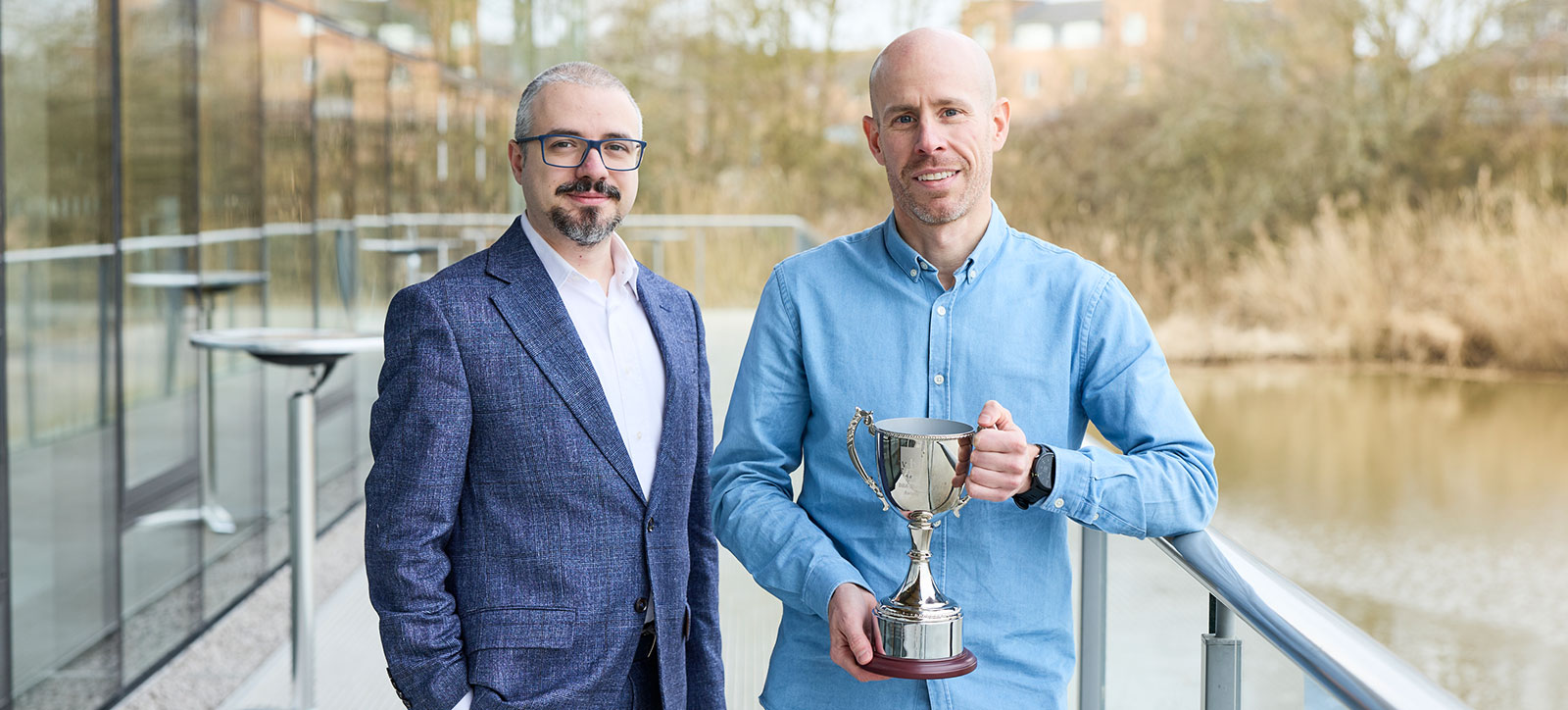
Top man: Philipp Laqué (right) with the trophy and Giovanni Radaelli, DBA Programme Director
An investigation into how behavioural science ‘nudges’ can encourage consumers to take up more plant-based food options in quick service restaurants has won the Best DBA Thesis Award.
At a conference held at Warwick Business School for its Doctorate of Business Administration (DBA) participants and alumni, the award was presented to Philipp Laqué, who is Managing Director of Revenue Management Solutions, a consulting firm that delivers analysis and insights to restaurant chains.
“Low demand for plant-based items presents a significant challenge,” said Dr Laqué. “So I started thinking about how you could shift consumer behaviour and I landed on the idea of using social norm nudges as a new strategy to increase interest in these items.”
In writing his study - From meat to plants: Leveraging social norms to shift food choices in quick service restaurants – Dr Laqué conducted two experiments to assess the effectiveness of this form of behavioural nudge aimed at subconsciously influencing people’s choices at quick service restaurants (QSRs), which include both fast food and slightly upscale chains that focus on quick service.
He said: “People often adjust their behaviour to align with what they perceive as the norm in their social group, so using three types of social norms intervention – descriptive, injunctive and dynamic – I ran an extensive online experiment with nearly 900 participants from across eight countries, seeing how different messages would affect their food selection.
“There was a cultural angle to it too – I wanted to see whether people in more collectivist cultures in Asia might respond differently to people in more individualistic Western cultures.”
A follow-up experiment employed social norm nudges across several units of a German QSR chain, involving more than 100,000 purchase decisions.
“I think this emphasis on experiments – both large-scale international and the real-world field study – made my thesis fairly unique,” said Dr Laqué.
Writing a DBA thesis
Originally from Germany, Dr Laqué has two degrees in international hospitality management – one from EHL Hospitality Business School in Switzerland, the other from Cornell University in New York – and has worked extensively in Europe in consumer research and market analysis.
In 2015, he moved to the London office of Revenue Management Solutions and not long afterwards began toying with the idea of a doctorate.
“You don’t start a doctorate just for career purposes; you do it because you are intellectually curious,” said Dr Laqué. “And when I started it in 2020 I certainly found it intellectually stimulating.
“That first year and a half I was reading literature from many different areas of expertise, and from many different perspectives.
“Once you have honed down on your research question, however, it is more a matter of execution. Analysing the data and writing it all up is a bit like running a marathon. You have to maintain your discipline – don’t give up, don’t slow down, just continue, continue that rhythm.”
Dr Laqué made use of Warwick Business School’s mentoring programme in the first two years, which proved helpful. However, the COVID-19 pandemic, particularly its effect on the restaurant industry, and a subsequent relocation to the Netherlands, made his thesis hard-going at times.
Now that he has completed it, the Managing Director believes his paper could provide some valuable insights for managers of QSRs.
“The findings of my evidence-based thesis suggest that the use of social norm nudges, particularly those emphasising behavioural shifts over time, could be an effective tactic in marketing strategies aimed at boosting demand for plant-based food choices,” he said.
Meanwhile, on a personal level, Dr Laqué believes he has gained new skills from writing his thesis.
“I now have a more structured approach to work. Is the data analysis properly done? How do we test and control this process? I apply the tools that I used in my thesis to my work.”
Putting theory into practice with a DBA
If Dr Laqué has found the practical relevance of his academic rigour, so too had speakers at the School’s DBA Conference.
Keynote speakers Peter Homa CBE and Staffan Hedén spoke about bridging the gap between academia and industry needs. The theme was continued with paper presentations from DBA participants and alumni.
Sara Daw, Group CEO of The CFO Centre and The Liberti Group, spoke about the early stages of her thesis looking at how to reframe ‘fractional work’ as a long-term solution for small and medium-sized enterprises, and how she hoped to apply that to her work providing firms with part-time and fractional C-suite professionals.
Kara Maitra, who is Deputy Chief Strategy & Transformation Officer at University Hospitals Coventry & Warwickshire, talked about her early research into scaling improvement in the National Health Service (NHS).
Both are part of a DBA cohort at WBS, which, for the first time, has more female participants than male. Made up of leaders from the worlds of business and public administration, 57 per cent of the class are female.
On the sidelines of the conference, female DBA participants from other WBS cohorts had some advice for the next generation of women leaders in business.
“Learn from your failures and never burn bridges,” said Boladale Akin-Kolapo, while Peace Ani added: “Have conviction, work hard and bring people along with you.”
Discover more about Warwick Business School’s Change Makers.
Learn more about behavioural science on the four-day Executive Education course Behavioural Science in the Real World at WBS London at The Shard.




 X
X Facebook
Facebook LinkedIn
LinkedIn YouTube
YouTube Instagram
Instagram Tiktok
Tiktok